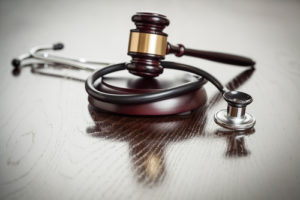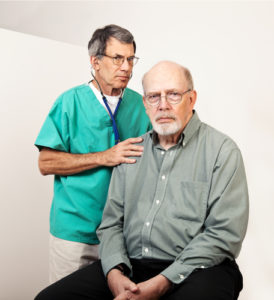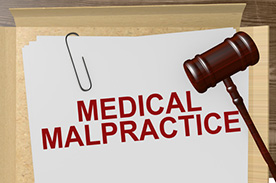

Columbia Medical Malpractice Attorneys
 Physicians, nurses and other health care workers provide life-saving care, eliminate painful conditions and improve quality of life. The profession has among its members very dedicated and compassionate individuals. But sometimes these highly trained professionals deliver substandard care or inadequate monitoring after a procedure. The results can be catastrophic. The team of competent Columbia medical malpractice lawyers at Kassel McVey can represent you in these cases.
Physicians, nurses and other health care workers provide life-saving care, eliminate painful conditions and improve quality of life. The profession has among its members very dedicated and compassionate individuals. But sometimes these highly trained professionals deliver substandard care or inadequate monitoring after a procedure. The results can be catastrophic. The team of competent Columbia medical malpractice lawyers at Kassel McVey can represent you in these cases.
An emergency room error is when a physician may misdiagnose a life threatening illness or injury. Surgical errors can cause injury to a critical structure or vessel during a routine operation. An obstetrician may not recognize apparent non-reassuring signs appearing on a fetal monitor strip during labor, demonstrating the need for an emergency cesarean section delivery. A pharmacist may commit prescription errors leading to an overdose of medication or delivery of the wrong medication. Hospital staff may fail to perform necessary safety precautions leading to surgery on the wrong body part. Anesthesia errors can cause permanent disability and even death. These hospital errors may lead to serious complications including bleeding, infection, respiratory distress, brain damage, paralysis, organ failure or death. The area of law that deals with harm caused by medical providers is called medical malpractice.
But not all bad outcomes support a medical negligence claim. A bad outcome alone is not enough to hold a physician liable. The plaintiff (person bringing the claim) must show more. A physician may become liable or legally responsible for an injury or a death only as a result of negligence. Negligence is unreasonable conduct under the circumstances. Negligence is the failure to do that which an ordinarily careful and prudent physician would have done under the circumstances; or it is the doing of that which an ordinary, careful and prudent physician would not have done under the existing circumstances. Negligence is the opposite of due care or reasonable care. Negligence is the failure to comply with the accepted standard of care utilized by prudent and competent practitioners. In other words, if the injury or death occurred even though the physician acted with due care, even though he did everything right, then there is no legal liability for the outcome. The law recognizes that some harms are not preventable. The plaintiff must prove negligence for all medical errors.
 As many Columbia medical malpractice lawyers will tell you, to successfully pursue a medical malpractice case, the plaintiff must establish through expert testimony the relevant standard of care. Courts will not allow a lay person to offer testimony regarding what a physician should have done or failed to do. The plaintiff must call an expert witness to establish the standard of care and any deviation from it. Experts are doctors, nurses or other trained professions with specialized knowledge due to their education, training and experience. As an expert, these witnesses are allowed to offer opinion testimony on the required standard of care. Unlike other types of legal cases lawyers handle, medical malpractice cases require expert witnesses. An action cannot be instituted without an affidavit of merit from an expert witnesses outlining at least one act of negligence. An expert witness could be a treating physician of the patient wishing to make a medical malpractice claim. However, treating physicians will often be reluctant to offer opinions critical of their colleagues. As a result, the plaintiff or patient must locate a physician willing to review medical records, imaging studies, any medical literature, and depositions in a particular case. The fundamental question is whether the plaintiff has a meritorious case. Did the doctor do wrong? More often than not, these expert witnesses will be from another state. Their fees for review, consulting, and offering testimony in a deposition or courtroom are expensive. As a result, considerable expense may be generated to determine if the client even has a case to pursue. In the right case, experienced medical malpractice attorneys in Columbia, SC Kassel McVey may advance the cost of these expert witness fees.
As many Columbia medical malpractice lawyers will tell you, to successfully pursue a medical malpractice case, the plaintiff must establish through expert testimony the relevant standard of care. Courts will not allow a lay person to offer testimony regarding what a physician should have done or failed to do. The plaintiff must call an expert witness to establish the standard of care and any deviation from it. Experts are doctors, nurses or other trained professions with specialized knowledge due to their education, training and experience. As an expert, these witnesses are allowed to offer opinion testimony on the required standard of care. Unlike other types of legal cases lawyers handle, medical malpractice cases require expert witnesses. An action cannot be instituted without an affidavit of merit from an expert witnesses outlining at least one act of negligence. An expert witness could be a treating physician of the patient wishing to make a medical malpractice claim. However, treating physicians will often be reluctant to offer opinions critical of their colleagues. As a result, the plaintiff or patient must locate a physician willing to review medical records, imaging studies, any medical literature, and depositions in a particular case. The fundamental question is whether the plaintiff has a meritorious case. Did the doctor do wrong? More often than not, these expert witnesses will be from another state. Their fees for review, consulting, and offering testimony in a deposition or courtroom are expensive. As a result, considerable expense may be generated to determine if the client even has a case to pursue. In the right case, experienced medical malpractice attorneys in Columbia, SC Kassel McVey may advance the cost of these expert witness fees.
Misdiagnosis, Delayed Diagnosis, Hospital Error, Botched Surgery – The Burden of Proof
The burden of proof is on the person bringing the claim. The plaintiff must prove through expert testimony what the applicable standard of care is and whether the defendant doctor deviated from that standard. If the plaintiff fails to prove any element of his claim the case will be lost.
 If after establishing the defendant (the party defending against the claim) deviated from the standard of care, the plaintiff must prove the deviation was a proximate cause of injury or death. It is not enough that the doctor was wrong or they provided inadequate follow-up after a procedure. The plaintiff must show the wrongdoing changed the outcome. That is, but for the physician’s wrongdoing, the injury or death would have been avoided. In some cases the causation issue is straight forward. For example, consider this case with a Columbia medical malpractice attorney, where a surgeon during a hysterectomy surgery misidentified a ureter and proceeded to place a clip across the vessel, thinking it was another structure. The backup urine and the resulting death of the kidney were clearly caused by the physician’s mistake. But now consider the case where a physician missed a malignant lung mass on a chest film and thus offered no treatment. Three months later after the missed diagnosis, the patient’s progressive symptoms led to further investigation including a chest CT scan. The cancerous mass was finally discovered. But testing revealed the mass was metastatic cancer and had spread to other areas of the body. The prognosis was dire and the patient ultimately died. Was the death caused by the physician’s delay in diagnosis or simply the aggressive progression of the disease? If the mass was already a metastatic cancer when it could have been first diagnosed, then likely the physician’s delay was not the proximate cause of the harm. Early diagnosis and intervention would not have changed the outcome. Questions of causation are complex and require expert opinion to explain. A plaintiff may need an expert on standard of care issues as well as a second expert on proximate cause issues.
If after establishing the defendant (the party defending against the claim) deviated from the standard of care, the plaintiff must prove the deviation was a proximate cause of injury or death. It is not enough that the doctor was wrong or they provided inadequate follow-up after a procedure. The plaintiff must show the wrongdoing changed the outcome. That is, but for the physician’s wrongdoing, the injury or death would have been avoided. In some cases the causation issue is straight forward. For example, consider this case with a Columbia medical malpractice attorney, where a surgeon during a hysterectomy surgery misidentified a ureter and proceeded to place a clip across the vessel, thinking it was another structure. The backup urine and the resulting death of the kidney were clearly caused by the physician’s mistake. But now consider the case where a physician missed a malignant lung mass on a chest film and thus offered no treatment. Three months later after the missed diagnosis, the patient’s progressive symptoms led to further investigation including a chest CT scan. The cancerous mass was finally discovered. But testing revealed the mass was metastatic cancer and had spread to other areas of the body. The prognosis was dire and the patient ultimately died. Was the death caused by the physician’s delay in diagnosis or simply the aggressive progression of the disease? If the mass was already a metastatic cancer when it could have been first diagnosed, then likely the physician’s delay was not the proximate cause of the harm. Early diagnosis and intervention would not have changed the outcome. Questions of causation are complex and require expert opinion to explain. A plaintiff may need an expert on standard of care issues as well as a second expert on proximate cause issues.
Criteria For Proving Medical Malpractice in Columbia
As you can see, a plaintiff must “connect all the dots” to be successful in a medical malpractice action. The plaintiff must prove:
- A physician-patient relationship existed
- The applicable standard of care
- Deviated from the standard of care
- The deviation from the standard of care was the proximate cause of the injury or death
- The extent of the injury or the loss to the family generated by the death
Failure to prove each element can be fatal to the plaintiff’s case. Kassel & McVey, established Columbia medical malpractice attorneys can assist you in doing so.
 At Kassel McVey a medical malpractice case evaluation begins a thorough interview with the plaintiff and family members. We need to understand from the client’s point of view what happened. We need to develop a chronology of events describing the medical care. Where did the plaintiff go for care? Who provided the care and when? Moreover what was the plaintiff’s baseline level of health prior to the events giving rise to the harm? From a thorough interviewing process we can develop a comprehensive list of healthcare providers from whom to order medical records, imaging studies, and other information. Once received, the medical records are organized, scanned, and reviewed. The medical records are all important. A complete medical chart generally provides the definitive account of what happened to the patient. The records may reveal the thought process of the physician. When studying the chart, the lawyer can begin to understand the timing of events. Chart review may lead to a decision by Kassel McVey not to pursue the case. The review is a selective process. As stated above, not every poor outcome in medicine can support a viable medical malpractice action. If we do not take your case, we will return the records to you. If you wish to pursue a second opinion with another Columbia medical malpractice attorney, you will have the records to do so.
At Kassel McVey a medical malpractice case evaluation begins a thorough interview with the plaintiff and family members. We need to understand from the client’s point of view what happened. We need to develop a chronology of events describing the medical care. Where did the plaintiff go for care? Who provided the care and when? Moreover what was the plaintiff’s baseline level of health prior to the events giving rise to the harm? From a thorough interviewing process we can develop a comprehensive list of healthcare providers from whom to order medical records, imaging studies, and other information. Once received, the medical records are organized, scanned, and reviewed. The medical records are all important. A complete medical chart generally provides the definitive account of what happened to the patient. The records may reveal the thought process of the physician. When studying the chart, the lawyer can begin to understand the timing of events. Chart review may lead to a decision by Kassel McVey not to pursue the case. The review is a selective process. As stated above, not every poor outcome in medicine can support a viable medical malpractice action. If we do not take your case, we will return the records to you. If you wish to pursue a second opinion with another Columbia medical malpractice attorney, you will have the records to do so.
If we believe further review of the chart is warranted, we will consider hiring an expert to review the records. The experts we look for are generally physicians or nurses in private practice or employed in an academic position, and who have the following attributes:
- Competence in the particular medical field in question
- Ability to teach complex ideas simply
- Honesty
- Willingness to review records, deposition testimony, medical literature and other evidence
- Willingness to travel and give testimony at depositions and at trial
Litigation Costs of a Medical Malpractice Case
Given the litigation costs of these cases, medical malpractice lawyers generally only take cases involving profound and permanent injuries and damages.
Lawyers in Columbia who take on a medical malpractice claim must be prepared to thoroughly investigate the claim, research the area of medicine, locate appropriate experts, determine whether a viable theory of liability exists, fund or participate in the funding of the litigation, prepare for trial, and ultimately try the case. Unlike many other types of cases in litigation, medical malpractice cases oftentimes are not settled and are tried before a judge and jury. Make sure your Columbia medical malpractice lawyer has experience handling these types of cases.
Statute of Limitations for a Medical Malpractice Lawsuit in South Carolina
 In South Carolina there is a statute of limitations regarding medical malpractice actions. The statute of limitations is a time period in which a claimant must bring his or her claim or lose it. For a health care provider in private practice there is a three year statute of limitations. What that means is that a Notice of Intent to File Suit or Complaint, along with an Affidavit of Merit, must be filed at the appropriate courthouse within three years of the date the claimant knew or should have known he or she had a potential claim against a healthcare provider. The clock starts ticking when a reasonable person would have realized he or she had a potential claim. The start of the time period may be the date of the medical intervention, the death, or recognition of the harm. Failure to comply with the statute of limitations would result in any late filed claim being dismissed regardless of merit. There is a two year statute of limitations for health care providers funded by state or local government. Determining the statute of limitations can be tricky. Therefore, do not wait unnecessarily before you see a Columbia medical malpractice law firm about a potential case.
In South Carolina there is a statute of limitations regarding medical malpractice actions. The statute of limitations is a time period in which a claimant must bring his or her claim or lose it. For a health care provider in private practice there is a three year statute of limitations. What that means is that a Notice of Intent to File Suit or Complaint, along with an Affidavit of Merit, must be filed at the appropriate courthouse within three years of the date the claimant knew or should have known he or she had a potential claim against a healthcare provider. The clock starts ticking when a reasonable person would have realized he or she had a potential claim. The start of the time period may be the date of the medical intervention, the death, or recognition of the harm. Failure to comply with the statute of limitations would result in any late filed claim being dismissed regardless of merit. There is a two year statute of limitations for health care providers funded by state or local government. Determining the statute of limitations can be tricky. Therefore, do not wait unnecessarily before you see a Columbia medical malpractice law firm about a potential case.
South Carolina also has a statute of repose. This is a statutory rule which bars any actions for negligence against a health care provider after six years from the negligence. It has nothing to do with knowledge of a potential case. It is simply a deadline. No claims after six years.
SC Malpractice Lawsuit Fees and Costs
Attorney fees and litigation costs are two different things. At Kassel McVey we charge our clients in medical malpractice actions a contingent fee. A contingent fee means the client pays a fee only if there is a recovery. If there is no recovery there is no fee. If there is a recovery, the fee is a percentage of the recovery. In medical malpractice actions the fee may be up to 40% of the recovery. A contingent fee allows clients to have access to lawyers and ultimately courtrooms without coming out of pocket to pay attorney fees. If attorney fees are generated they are paid at the end of the case from the recovery.
Litigation costs differ from attorney fees. Litigation costs typically are generated by necessary services rendered by other individuals or companies. Costs can include expert hourly fees, court reporter fees, travel expenses, court costs, and the like. Discuss with your lawyer who will be responsible for paying litigation costs.
Caps on Medical Negligence Damages in South Carolina
The purpose of bringing a medical malpractice action in South Carolina’s civil justice system is to receive compensation for a harm or loss caused by a negligent health care provider. A trial is about persuading a jury to “balance” the harm or loss inflicted with an appropriate amount of money compensation. South Carolina medical malpractice attorneys like Kassel McVey can expertly handle your claim, however it is important to realize that our South Carolina legislature has promulgated caps on damages in medical malpractice actions. This means there may be a ceiling on how much a plaintiff can recover irrespective of the size of the harm or loss suffered. For example, in actions against state funded physicians, the legislature imposed a cap on damages regardless of the extent of injury, amount of lost income, or amount of past or future medical bills. For state funded non-physicians there is also a cap on damages. Likewise in actions against privately funded health care providers, there are caps on non-economic damages like pain and suffering. There are also caps on punitive damage awards. Caps on damages can have a profound impact on an award or settlement in a medical malpractice action. Be sure to discuss these issues with your SC medical malpractice lawyer to better understand their implications on your case.
Contact Kassel McVey
If you think that you or a family member or friend has experienced medical malpractice, contact us.
We are here to help. At Kassel McVey we take the time to listen to you, understand your situation, answer your concerns, and guide you through the legal process.
For more information or to schedule a free consultation in Columbia, call Kassel McVey today at (803) 256-4242.
Personal Injury Lawyers 1330 Laurel Street Columbia, SC 29201 Phone: 803-256-4242
Mailing Address
Post Office Box 1476
Columbia, South Carolina 29202
Fax: (803) 256-1952
Copyright © 2023 John D. Kassel, Attorney at Law, LLC. All rights reserved. Privacy Policy I Terms of Service | Disclaimer
This website is designed for general information only. The information should not be construed to constitute formal legal advice or the formation of a lawyer/client relationship. The results and testimonials listed on this website are specific to the facts and legal circumstances of specific cases and should not be used to form an expectation that the same results could be obtained for other clients in similar matters. This list is not a description or characterization of the quality of the firm's representation, it is not intended to compare one attorney's work to another and is in no way a guarantee of a specific result for your case.


